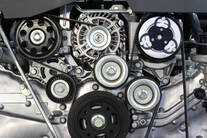Sounds A Car Can Make

1) Knocking Noises
You will hear knocking noises whenever you accelerate your vehicle or change gears. The knocking will come from the inside of the engine. The sound signifies a problem with the timing of the air and fuel mixture’s ignition within the engine's cylinders. If the ignition happens too early, you will hear these knocking sounds. The timing of the ignition is crucial because it determines whether the proper amount of power will be produced.
A simple engine tune-up for your vehicle might fix the problem. If the sounds remain, your engine could have a worn-out component that needs to be replaced or repaired, or worse, you may require your engine replacement! Anytime you need work done on the engine, hiring a mechanic for such a task will cost a lot of money. Before you do this, see if your car has a knock sensor that manages these sounds. If it does, then replacing the knock sensor might be all you need to do to eliminate the sounds.
Also, check the engine oil level and verify that it is correct.
2) Cold Start Rattling Noises
It is natural for some of the newer car engines to rattle a bit during a cold start. The rattle comes from the timing chain that is used with the engine. As the years go by, the engine will start to rattle as it ages. If you hear these rattling noises, then it likely means your timing chain is wearing out. If you already know that your engine has a timing chain, then you should get it inspected by a mechanic. They have the proper diagnostic equipment to check on it correctly. Otherwise, the worn-out timing chain could end up damaging your engine.
3) Tapping / Clicking Noises
When your engine runs, do you hear constant tapping or clicking noises? If so, this could be the upper valve train that manages the opening and closing of the exhaust valves and air intake valves. You can determine whether the upper valve train is responsible for the noises by removing the engine head and evaluating it. You’ll see the camshaft moving the tappets and the springs, returning them into their original positions. If the engine has reduced oil pressure or worn-out springs, these tapping and clicking noises may be heard. Also, check the oil dipstick to check how much oil is in the engine. Maintenance tip: Get regular oil changes!
4) Shrieking / Squealing Noises
Most people hear squealing and shrieking noises from their engine after a while. The belts are actually the parts that generate these noises. The belts connected to the engine are also used to run the AC compressor, power steering pulley, and timing. The newer belts are made from rubber instead of chains. A cold-started engine will cause the noises to grow louder. The noises will gradually disappear as you start driving and accelerating your vehicle. The belts may slip away from the pulley, which would cause you to hear this noise. Worn-out or loose belts often due slip away from their pulleys like this. That is why you need to replace your belts if they appear worn out. Either that or tighten the serpentine belt and test to see if you continue to hear the noises.
5) Grinding Sounds
It is a transmission issue if you shift gears in a manual transmission vehicle and hear grinding sounds. The gears in the transmission are probably grinding aggressively against one another. A lot of the older manual cars have this problem. Don’t assume the transmission is bad, though, because the transmission may not be able to be disengaged from the engine by the clutch. Either that or the clutch is not being depressed right away before shifting. Get transmission service!
When someone learns how to operate a stick shift for the first time, it is common for them to encounter this problem. In some cases, the clutch mechanism may be too old and worn out rather than the driver’s actions being the cause of the sounds. If you have a worn-out clutch system, then it should be replaced.

 RSS Feed
RSS Feed